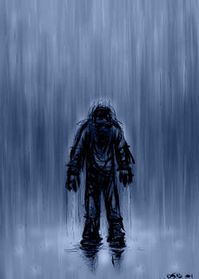The lady selling me the highlighter wasn’t exactly sure if the yellow inky stuff inside the highlighter was banned. I had asked. She said no one told her she couldn’t sell the pens but that I might as well just "innocently" stick it down further in my shirt pocket when going through the boarding gate. As I was already within the secured area I took her advice.
Mean time the lady at Second Cup was pouring all purchased bottled water and juices into plastic cups to make sure people consumed them before boarding.On the early morning ride the cab driver had said the terrorists were sticking up the world and it "just wasn’t right".
It’s difficult to know what goes on in the brain of a bomber, especially a suicide bomber. Ideology, revenge, property, resources, historical claims etc. all figure into it I suppose, but after a while it seems that violence and the war itself is the object of desire.
My wife Deb said it might be hard to find an old suicide bomber. It’s true. Usually age greys ideologies of blood and soil, confidence in violence wanes, maybe even possessions are seen with clearer perspective, and maybe relationships are venerated. All of this makes it hard to blow yourself and others up.
It’s the young that warlords and ideologues know to recruit. A dispossessed young person is fertile ground for an absolutist cause, particularly when that cause is habitually linked to a transcendent cause and calling.And any cause will do. Christian, Muslim, Jew. As long as the victims are well hidden. That is, abstracted and exterminated as infidels or pagans long before any plastique or nitroglycerine tears their limbs away.
In the end the bombers probably have very little knowledge about their "cause", outside of what’s been prescribed. "Causes" are like that. Veneers of freedom and security conceal confusion and a great vacuum. The original object of conflict is lost and people get locked into a spiralling conflict.
But then…as we took off for Canada’s east coast…there was the morning sunrise…
Technorati Tags: Peace, Violence, Terrorism, Sunrise


